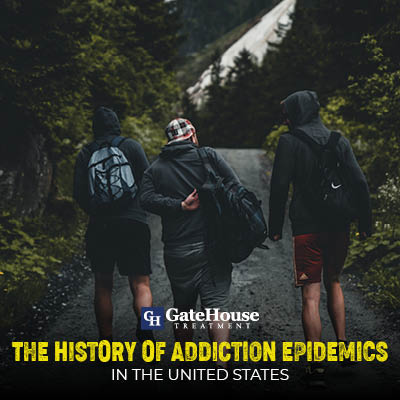
What is going on now with opioids, this isn’t the first addiction epidemic the United States has had. It has had multiple different addiction epidemics with different substances and addiction treatment centers. From alcohol, to crack cocaine, to opioids, and heroin.
The History of Addiction in the United States
Alcohol Epidemic
In the sixteenth century, alcohol (called “spirits”) was used mostly for medicinal purposes. At the beginning of the eighteenth century, the British parliament passed a law encouraging the use of grain for distilling spirits. Cheap spirits flooded the market and reached a peak in the mid-eighteenth century. In Britain, gin consumption reached 18 million gallons, and alcoholism became widespread.
The nineteenth century brought a change in attitudes, and the temperance movement began promoting the moderate use of alcohol—which ultimately became a push for total prohibition.
In 1920 the US passed a law prohibiting the manufacture, sale, import and export of intoxicating liquors. The illegal alcohol trade boomed, and by 1933, the prohibition on alcohol was removed.
Today, an estimated 15 million Americans suffer from alcoholism, and 40% of all car accident deaths in the US involve alcohol.
Amphetamine Epidemic
Amphetamines fueled the first addiction epidemic. Synthesized in 1887 and gaining popularity in the 1920’s, amphetamines had been used in the medical community for raising blood pressure, enlarging nasal passages, and stimulating the central nervous system.
Abuse of amphetamines started in the 1930’s when it was marketed as an over the counter inhaler. It took off even further during World War II, where it was widely given to soldiers to combat fatigue and improve endurance. As legal usage of amphetamines increased, a black market emerged. (Sound familiar?)
Cocaine and Crack Cocaine Epidemic
The next addiction epidemic came in the form of cocaine. Cocaine was also given to soldiers and used medically at first. In fact, by 1902 there were nearly 200,000 legal cocaine addicts in the United States. Cocaine usage in the United States peaked in 1982 after it was declared illegal.
After cocaine, as most know, came the crack epidemic, and what an epidemic it was. Crack cocaine first appeared in big cities such as LA, Miami, and NY around 1985. Crack was cheaper than cocaine and for a lot of people, more readily available. Between 1984 and 1990, when the drug spread across American cities, the crack epidemic dramatically increased the number of Americans addicted to cocaine. In 1985, the number of people who admitted using cocaine on a routine basis has risen from 4.2 million to 5.8 million.
Opioid Epidemic
Then came opioids. Opioids have been used medicinally since man first had pains. Starting with opium smoking, into synthesizing the opium into a more potent medicine known as morphine—but they called it heroin.
The Civil War led to the United States’ first wave of morphine addiction. In the second major wave, it was heroin on the jazz scene during the 1930s and 40s. From there, use stayed steady. Now, the number of heroin users is astronomical, in part to do with the fact that so many were addicted to legal forms of the drug. Oxycontin, Percocet, Vicodin, etc. From 2000 to 2015, more than half a million people died from drug overdoses. 91+ Americans die every day from an opioid overdose.
Whatever the substance, one thing is for sure, the United States has had multiple addiction epidemics, and the opioid epidemic is one of the worst. Finding easy access to a local drug addiction treatment center is critical.
If you need help for addiction and have questions about addiction treatment centers, please contact GateHouse Treatment today. You can heal, We can help! (855) 448-3588
- Cymbalta Withdrawal: Causes, Symptoms, And Management - October 12, 2023
- Boredom in Recovery: 5 Tips to Avoid Relapse - October 6, 2023
- Overconfidence and Rehab: Avoiding Relapse - October 4, 2023




